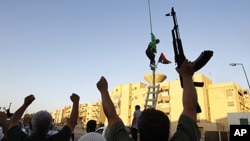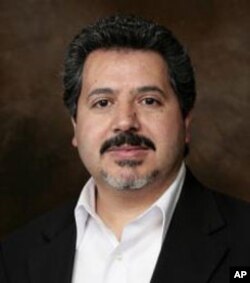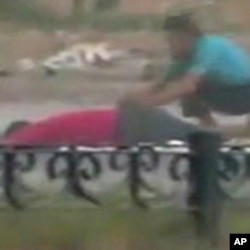Are the countries embroiled in the Arab Spring learning from one another? Or more to the point, has the sudden turn of events in Libya offered clues to Syria’s revolutionaries on how to finally prevail after months of seemingly fruitless and unquestionably bloody protests? Syrian activists say that the dramatic changes this week in Tripoli have given Syrians new hope that the Arab Spring endures and victory may be at hand.
The euphoria of Libyan revolutionaries who overtook Gadhafi’s stronghold of Bab Al-Aziziya, is beginning to have a galvanizing effect on Syrian activists.
Iyas Al Maleh is the son of 80-year-old Haitham Al-Maleh, the reknowned Syrian lawyer and rights activist who was released last March from prison in Syria. Haitham had been jailed for “undermining the national sentiment.” Father and son are currently living in exile in Egypt.
Al-Maleh believes that the apparent victory in Libya will have an impact on how Syrian protesters continue their efforts to oust Assad. “I think that it will just give them more moral support. Now, the world can actually focus on Syria, not having to focus on Libya and leaving people to die in the streets on a daily basis in Syria,” he said.
Now that the Libya crisis appears to be resolving, says Al-Maleh, the international community can focus renewed attention on not just Syria, but Yemen, which Al-Maleh hopes can also be resolved.
Other Syrian activists agree that the victory in Tripoli will have a positive impact on the Syrian protest movement. “It’s been wonderful news for Syria and Syrians,” said Dr. Najib Ghadbian, Professor of Political Science at the University of Arkansas and a Syrian activist.
“I can tell you that over the last three days or so in Syria, we have slogans and demonstrators shouting basically sympathy and support of the Libyan people against Gadhafi, saying something like ‘Gadhafi is gone, it’s your turn, Bashar.’ One more dictator down is definitely a major moral victory for the people of Syria,” he said.
Impact on Syria
Ghadbian points out that Libya, for a time, had a negative impact on the Syrian situation. Gadhafi’s unwillingness to compromise, “basically forced that movement to shift from a peaceful protest movement into an armed rebellion.” But Gadhafi’s recalcitrance seems to have backfired as his regime has endured crippling sanctions, international condemnation, NATO airstrikes and now the loss of the Libyan capital of Tripoli. Gadhafi is now in hiding.
Which brings up another concern that some analysts have expressed: Could the Syrians, seeing that their own peaceful protests have so far failed to bring down Assad, look to Libya’s success and decide that they, too should take up arms? Or is civil disobedience the answer?
Ghadbian does admit that there have been a few activists inside Syria who have begun to reconsider their strategy. “They say to themselves, ‘well, you know, we continue to just go out and be peaceful and be killed.’ We have heard of some individuals arming themselves or using weapons to defend themselves, but these have been minor,” he said.
“It’s not the preferred strategy of the opposition,” said Ghadbian, “inside or outside. I think one of the strengths of the Syrian version of this Arab Spring is its peacefulness. It’s true that the regime has pushed people to use weapons, but I think so far they’ve understand that if they were to do so, that would give the justification for the Assad regime to carry out mass oppression.”
Outside intervention
Military intervention from the outside is becoming a more attractive option, one that has been resisted by protesters until recently. A source close to several Syrian opposition groups, who asks not to be identified, say that while peaceful protest has been effective, it doesn’t mean that Syrians wouldn’t support the idea of some kind of outside intervention.
Seeking U.S. intervention is unlikely but an air campaign led by NATO or some kind of ground intervention by the GCC’S Peninsula shield is another matter. “The demonstrators realize that handguns and rifles can do nothing against the army,” he said. “They would carry arms if they get foreign support or if a few generals defected with dozens of armored units.”
The same Syrian source confirmed reports in Germany’s Zeit magazine that demonstrators this week, for the first time since the beginning of the uprising, are calling for foreign intervention. Protesters are beginning to hold placards with specific demands. One video from MrAboAsad on YouTube shows demonstrators in the northern Syrian town of Maarat an Numan thanking the U.N. for its efforts so far and requesting a no-fly zone the Syrian Air Force - it isn’t clear exactly who the demonstrators want to impose that embargo.
Another video from Shams News Network in Syria shows demonstrators in Hama asking for the GCC’s Peninsula Shield Force to intervene in Syria. “We are getting massacred,” reads the placard. The signs indicate a new sentiment on the street that was absent before the fall of Tripoli.
Assad: No interference
Indeed, the arrests and killing of protesters continued this week across Syria, in spite of Assad’s repeated promises of reform. The United Nations says more than 2,000 have died so far in the crackdown on demonstrators and this week adopted a resolution condemning Syria for human rights violations. The U.N. is also calling for an international investigation into possible crimes against humanity.
Still, Assad appears to be pursuing a policy of lackluster reform proposals backed by brutal military attacks on his own citizens. Like Gadhafi months ago, Assad appears unwilling to bend. On Sunday, Assad delivered a stern warning against outside interference. In an interview on Syrian state television, the Syrian president said he might accept advice from outside players, but would not allow “any country to interfere” in Syria’s handling of the uprising.
Meanwhile, Syria’s opposition this week took a crack at forming a national council, modeled on the Transitional National Council in Benghazi. That council gave the international community an alternative political entity to help shape a post-Gadhafi Libya while they used the NATO air campaign to weaken him militarily.
Ghadbian, who was present at earlier meetings of Syrian opposition groups in Istanbul, says he believes the Syria opposition is close to coming to a unified statement which will united the dissidents in a political body.
“The vision, actually, is to have a council that represents both the outside [i.e., independent activists in exile in the U.S. and Europe] and the inside [activists on the ground in Syria]. We are going to help the inside to do their part. But we’re not going to wait for them. We feel we have to make that effort collectively and more systematic ally,” he said.
Ghadbian believes that the opposition will be able to make a definitive announcement within the next week. Until that happens, or a more decisive move is adopted by the U.N. Security Council to offer assistance as they did in Libya, Syrians will take to the streets on their own once more.


















